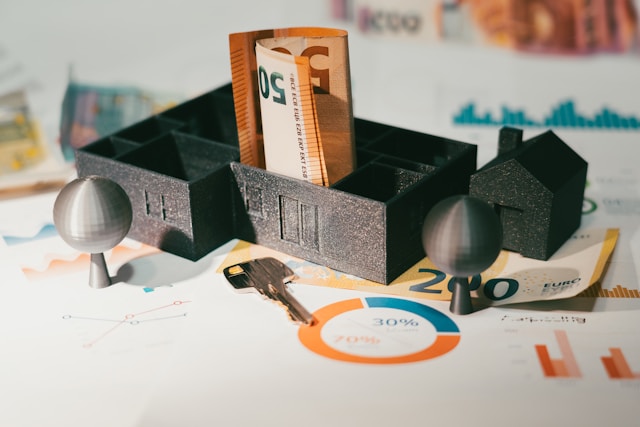When it comes to buying property in the UK, you have two main options: freehold and leasehold. As prospective buyers, you must understand the critical differences between these two types of property ownership and consider the potential financial risks associated with opting for a leasehold property. This article offers tailored advice to help you navigate through the complexities of leasehold ownership, including ground rent, service charges, lease extensions, and the role of freeholders.
Understanding Leasehold Properties
Before delving into the financial risks involved, it’s crucial to understand what a leasehold property is. When you buy a leasehold property, you’re essentially buying the right to live in a property for a set number of years – the ‘lease’. You don’t own the land it sits on; that belongs to the ‘freeholder’ or ‘landlord’.
A lire aussi : How to approach the UK shared ownership scheme if you have an irregular income?
As leaseholders, you’re bound by certain terms set out in your lease. These typically include paying ground rent to the freeholder and contributing towards the cost of maintaining and managing the property (known as service charges). It’s important to note that the conditions of a lease can vary dramatically from one property to another, making it critical to thoroughly review each lease before buying.
Financial Risks of Buying a Leasehold Property
Ground Rent
One of the most significant financial implications of owning a leasehold property relates to ground rent. Ground rent is a regular payment that leaseholders owe to the freeholder. The amount and the terms of increase are outlined in the lease. Unfortunately, for some properties, ground rent can escalate rapidly, causing significant financial strain. This is particularly true for leases with ‘doubling clauses’, where ground rent doubles every few years.
A découvrir également : What are the key considerations when choosing between a home equity loan and a remortgage in the UK?
Service Charges
Another potential financial risk comes in the form of service charges. These are the costs that leaseholders are required to pay towards the upkeep of the property, including general maintenance, repairs, and insurance. The trouble with service charges is that they can be unpredictable and potentially high, depending on the nature of the work required and how it’s managed.
Lease Extensions
Over time, the length of the lease decreases and, if it drops below a certain number of years (typically 80), the property can become difficult to sell or mortgage. Extending the lease can be a costly process, particularly as the length of the lease decreases.
Mitigating the Financial Risks
Now that you’re familiar with the risks involved, let’s explore how you may mitigate these potential financial pitfalls.
Review the Lease Carefully
One of the most effective ways to avoid unexpected costs and complications with leasehold properties is to thoroughly review the lease before buying. Look for any clauses that could result in significant future costs, such as ground rent increases or potentially high service charges.
Negotiate Terms
Another option is to negotiate the terms of the lease before buying. This could involve negotiating ground rent terms to ensure they don’t escalate too quickly, or establishing a cap on potential service charges.
Check the Remaining Lease Length
If you’re considering buying a leasehold property with a relatively short lease, you may need to factor in the cost of extending the lease into your financial planning. Ideally, you should aim to buy a property with a lease of at least 80-90 years remaining.
Seek Professional Advice
Engaging with a property lawyer or financial adviser can be invaluable in helping you understand and navigate the potential financial risks of a leasehold property. They can provide expert guidance on reviewing and negotiating leases, as well as advice on lease extensions and other potential costs.
The Role of Freeholders
The role of the freeholder is key in leasehold properties. The freeholder owns the property and the land it sits on, and they have a number of responsibilities, including maintaining and managing the property. They also have the right to collect ground rent and service charges from the leaseholders.
However, it’s important to understand that freeholders also have significant power over leaseholders. They can enforce the terms of the lease and may have the power to choose the contractors for maintenance and repairs, which can have a significant impact on the service charges you pay.
So, when buying a leasehold property, ensure that you are comfortable with the role of the freeholder and their approach to managing the property. Also, remember that you might have the right to challenge unreasonable service charges or to collectively buy the freehold with other leaseholders under certain circumstances.
In conclusion, owning a leasehold property can come with a unique set of financial risks. By understanding these risks and how they can be mitigated, you will be in a better position to make an informed decision when buying a leasehold property.
Understanding the Role of an Estate Agent in Buying a Leasehold Property
Engaging with an estate agent can be very beneficial when you’re considering buying a leasehold property. An experienced agent can provide expert guidance and valuable advice about the potential financial risks associated with leasehold properties.
In the UK’s real estate market, an estate agent plays a key role in facilitating property transactions. They are responsible for listing properties for sale, arranging viewings, and negotiating terms between buyers and sellers. Their role becomes particularly crucial when the property for sale is a leasehold.
When you engage with an estate agent to buy a leasehold property, it’s their duty to disclose all pertinent details about the property. This should include information about ground rent and service charges, the length of the lease, any restrictions in the lease agreement, and the identity of the freeholder.
The estate agent can also provide you with an estimate of the potential costs associated with extending the lease if it’s short. This information is crucial for your financial planning. Be sure to ask about the history of service charge payments and any significant increases. The agent should also be able to provide information about the freeholder’s approach to property management.
Remember, one of the disadvantages of buying a leasehold property is the potential for unexpected costs. An experienced estate agent can help you navigate these complexities, providing you with all the information you need to make an informed decision.
Freehold vs Leasehold: Key Differences
Before you decide to buy a leasehold property, it’s important to understand the differences between leasehold and freehold properties.
In simple terms, if you buy a freehold property, you own both the building and the land it sits on. You have complete control over the property and there are no ground rents or service charges to worry about. You are, however, fully responsible for all maintenance and repairs.
When you buy a leasehold property, you only buy the right to live in the building for the length of the lease. The land the property sits on remains owned by the freeholder. This type of ownership comes with certain obligations such as ground rent and service charges. You may also need to get permission from the freeholder for certain changes you wish to make to the property.
Despite the potential drawbacks, many people opt for leasehold properties, especially when buying flat in cities, where freehold options may be limited. But being aware of the financial risks, and taking appropriate measures to mitigate them, can make buying leasehold a viable option.
In Conclusion
To sum up, buying a leasehold property in the UK involves a unique set of financial risks, and potential buyers must proceed with caution. Ground rent, service charges, and the cost of extending the lease are among the main financial considerations.
However, the potential risks could be mitigated through diligent review of the lease agreement, negotiation of terms, and professional mortgage advice. Understanding the role of an estate agent and the differences between freehold and leasehold properties can also guide you in making informed decisions.
While the decision to buy a leasehold property should not be taken lightly, being fully aware of the potential pitfalls and how to avoid them can help you navigate through the financial risks and make a successful property purchase.






